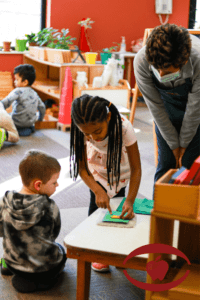
Montessori is an educational approach that allows children to choose how to learn. The concept does not set predetermined schedules, so your child has learning freedom. Also, educators do not give assignments, deadlines, or tests. As a result, your child grows at an individualized pace.
Certain elements characterize the Montessori education system. Here are five of these elements.
1. Free Choice Work Periods
The Montessori system does not have timetables or bells to separate the schedule. Teachers also do not teach but guide the students to learn. The work cycles range from 2-3 hours based on the program level. For instance, infants and toddlers have a minimum of two hours of work cycles daily. On the flip side, early childhood can have two or 3-hour cycles.
Your child chooses what to do and how long to perform a given task during a cycle. Then, the child switches to another activity without interruption. The teacher monitors your child’s work to provide individual or small-group lessons. Uninterrupted work periods instill a sense of responsibility, concentration, coordination, and independence.
2. The Multiage Classroom
Montessori does not divide children by grade or age. Instead, the classrooms span several years, usually three years of age. The six Montessori class sections include:
- Infants. Newborns to 18 months old
- Toddlers. 18 months to three years
- Early childhood. 2.5 to six years old
- Lower elementary. 6 to nine years old
- Upper elementary. Nine to twelve years old
- Secondary. 12-15 and 15- 18 for three-year gap systems and 12-14, 14-16, and 18-18 for two-year gap curriculum
However, the age span may vary slightly among different institutions. This arrangement encourages your child to learn by observation. Also, older children reinforce the learned and develop skills to lead others. Besides, the arrangement fosters collaboration as opposed to competition.
3. Prepared Environment
The Montessori Method relies on crafty, beautiful, and distinct learning materials to inspire learning curiosity. Each material teaches a single concept or skill. In addition, teachers observe the children and tailor the materials to meet individual needs and interests.
Montessori classrooms maintain a high sense of organization and cleanliness. For example, the teachers keep all materials on shelves. Then, each student selects and disassembles a material and returns it to the original location. As a result, students learn to be responsible, organized, and independent.
4. Child-Directed Work
Montessori education believes that facts are just part of the knowledge which your child should cultivate during growth and development. So, the approach does not merely feed the students with examinable facts. Instead, each child is allowed to experience freedom with limits. The students learn through exploration and work on tasks of interest individually or in a team.
Montessori instruction does not have a one shoe fits all approach. Instead, the learning space encourages the students’ natural curiosity. As a result, the children are free to explore and learn with materials that interest them. Also, with observation, the teachers can design activities that match your child’s specific age and ability.
5. Practical and Sensorial Learning Materials
According to Dr. Maria Montessori, a child learns best when they do things for themselves. So, Montessori educators deploy hands-on experience as one of the crucial facets of your child’s education. But, first, the classroom learning materials your child encounters, e.g., household utensils, make up the practical life.
Classroom activities involve materials such as household utensils that your child experiences daily. Next, the teacher introduces sensorial materials as your child focuses on self-selected activities. Each object’s sensorial materials isolate one concept for your child to internalize. The goal is to prepare your child for academic subjects and allow self-correction with reduced teacher support.
The Montessori Method is conducive to various developmental pathways and educational styles. Besides, the environment is favorable to children from birth to 18 years old. If you wish to explore more about the Montessori system, look no further than Miniapple International Montessori School.

